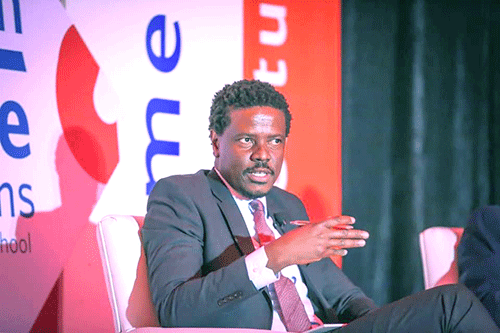Running a successful football club in Namibia requires more than just passion for the sport. It demands a solid financial foundation and an effective organisation structure, as revealed by African Stars chairman Salomo Hei.
Stars, one of Namibia’s most successful football clubs, provides an insightful template for aspiring local club owners and managers.
The club’s journey began in 1962 and over time, it has evolved into a sporting powerhouse.
The club boasts an impressive record of continental and domestic achievements. They made their mark in the CAF Cup with appearances in 1992 and 2014, while also making waves in the CAF Champions League with two notable appearances in 2019 and 2020. Additionally, they clinched the Dr Hage Geingob Cup runners-up title in 2014, 2015 and 2022, securing a third-place finish in 2016.
Their prowess extended to the Standard Bank Cup, where they emerged as runners-up in 2014, and claimed victory in 2015. Domestically, they have been formidable, clinching the Namibian Cup Championship in 2007, 2010, 2013, 2014 and 2018. Their dominance in the Namibian Premier League is evident, with triumphs in the 1994, 2008/09, 2009/10, 2014/15, 2017/18, 2021/22, 2022/23 and 2023/2024 seasons.
In an exclusive interview with this publication, Hei shared his insights into the key components of running a successful football club.
He said the measure of success can mean different things to different institutions, and stressed the importance of accountability resting with expertise, ensuring that everyone understands their roles and responsibilities.
“We have clearly-defined roles. You will never see the chairman of Stars in the locker room, giving technical input to the team, precisely because accountability should rest with expertise, and the most important is that objectives are clear to everyone.”
Hei added that success for Stars means being the best and doing the best. “An important factor in achieving this is the ability to make decisions in the best interest of the club,” he shared.
He spoke passionately about the importance of both on-field and off-field achievements. “On the field, it’s about being competitive and always giving your best with the badge on your chest. Off the field, it’s about elevating the brand, and remaining at the cutting edge of new ideas,” said the chairman.
Effective leadership, Hei emphasised, is paramount in ensuring the success of a football club. “Everything rises and falls on leadership. The reason why men fail is broken focus, and effective leadership brings focus,” he added.
In terms of engaging with the local community and building a strong fan base, Hei highlighted the importance of cultural engagement, such as the Okaserandu folklore initiative. “It’s important that we take our community along with us as we move into the future.”
He added that they have some interesting developments for the new season around mass mobilisation, and consolidating the membership of the club.
Furthermore, Hei spoke about financial stability, explaining that it is crucial for sustaining success. “Financial health is a function of planning. Clubs must move away from the big man syndrome to remain sustainable. We have seen clubs crumble as soon as the big man leaves. This is why we are looking at different funding structures for Stars. We are not keen on sponsorship, but we want partnership,” he stressed.
When it comes to player recruitment and retention, he revealed that the club relies on periodic technical reports and a wide network of scouts to identify emerging talents. “We support the recommendations of our technical team, and continuously scout for new talent.
We are also the team that has exported the most players.
Distinguishing a well-run club from others comes down to leadership and organisation. “Leadership should provide certainty and foresight. In the absence of that, you’re just guessing.”
The chairman further addressed the challenges and setbacks the club faced, having been instructed by Fifa to pay their former coach George Koffie Prins, whom they unfairly dismissed, as well as their Ghanaian striker Peter Ernest Adiwoh, for breach of contract.
He acknowledged that there are no perfect solutions. “The biggest challenge is convincing people of something they cannot see. There’s no perfect world and along the way, there will be speed bumps to slow you down. In our opinion, that is what Prins was, but the chapter is closed,” he said.
Looking ahead, Hei expressed his aspirations for Stars, aiming to elevate the club to the top tier of African football. “Our dream is to reach the group stages, (Caf Championship), to turn the club into a self-sustaining model, and grow our supporter base.
“Every household in Namibia should aspire to the Okaserandu brand.”
-lmupetami@nepc.com.na


